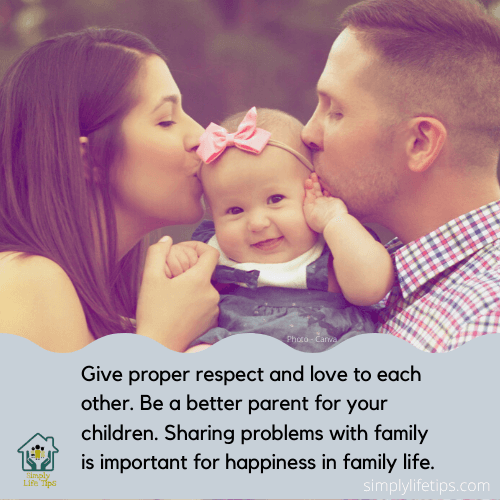Happy parents are the cornerstone of a child’s upbringing, shaping their values, attitudes, and behaviours in profound ways. From fostering honesty to instilling respect, the influence of parental happiness extends far beyond the home. In this blog, we’ll explore the pivotal role happy parents play in raising resilient and well-rounded children, highlighting the importance of their emotional well-being and offering practical tips for nurturing a positive family environment. Let’s discuss how parental happiness impacts the upbringing of our kids.
What Is The Meaning Of Happy Parents?
Happy parents refer to caregivers who experience a sense of contentment, fulfilment, and joy in their role as parents. It encompasses emotional well-being, satisfaction with family life, and a positive outlook on parenting. Happy parents prioritize their mental health and happiness, which positively influences the well-being and development of their children. They create a nurturing and supportive environment for their family, fostering positive relationships, and guiding their children with love and empathy.
The Influence Of Happy Parents
The influence of happy parents extends far beyond their happiness. Their behaviours, attitudes, and values serve as a blueprint for their children’s moral compass. When parents prioritize their mental health and happiness, they inadvertently pass on these qualities to their children, laying the foundation for a positive upbringing.

Parents are the first teachers of children. Kids pick up a lot from their mom and dad, both good and not-so-good stuff. Instead of pointing fingers at their children for their quirks, parents need to take a good look at themselves.
Parents invest a lot in their children, knowingly or unknowingly, through how they act, talk, and what values they hold dear. Kids learn a lot from watching their parents. If parents set a good example, kids usually follow suit. But if parents have some not-so-great habits, kids might pick those up too. Mental health and happiness in parents often rub off on their kids.
In a study from 2009, researchers found that although parenting comes with its fair share of stress and challenges, it can still enhance overall life satisfaction. However, the degree of this improvement depends on individual factors, such as personality traits. It’s important to note that merely having children doesn’t guarantee happiness.
The Benefits Of Good Parenting
Psychologists have noticed some common traits in kids raised by happy, mentally healthy parents.
Happy Parents Know The Value Of Honesty
Happy parents understand the importance of honesty and prioritise passing this value on to their children. Being transparent in their interactions with others and within the family, they set a powerful example for their kids to follow. Children raised in such an environment are likelier to uphold honesty as a core principle. They don’t resort to lying or deceit to achieve their goals, preferring to pursue success through fair and just means. These children take pride in their accomplishments, knowing that they have earned them through integrity and hard work, rather than through dishonest or unfair tactics.

Express Love And Interest
They openly express love and interest towards their children and others. This fosters a nurturing environment where children feel secure and valued, enabling them to form healthy relationships based on love and empathy.
Respect And Honor
Happy parents model respect and honour in their relationships with each other and others. Children emulate this behaviour, learning to value diversity, listen to differing opinions, and treat everyone with dignity and respect.
Time Management
They understand the importance of time and demonstrate diligence in their pursuits. They engage in meaningful activities and avoid time-wasting behaviours. They teach their children the value of hard work and productivity.
Foster Empathy
Happy parents encourage empathy by helping their children understand and appreciate different perspectives. Through active listening and empathy-building exercises, children develop the ability to empathize with others and navigate complex social situations.
Parenting With Empathy And Emotional Intelligence
In a 2016 study conducted across several countries, researchers discovered that individuals residing in regions with more favourable parental leave policies, flexible work arrangements, and other supportive measures for parents reported higher levels of happiness.

Tips To Become Happy Parents
Schedule playtime: Set aside time for fun activities, both for yourself and your children, to recharge and enjoy each other’s company.
Stay adaptable: Embrace change and remain flexible in your approach to parenting and life in general.
Involve your children: Include your kids in decision-making and rule-setting whenever possible, fostering a sense of responsibility and empowerment.
Prioritize self-care: Make time for activities that nurture your well-being and prioritize acts of self-care to recharge your batteries.
Host family check-ins: Schedule regular family meetings to communicate openly, address concerns, and strengthen family bonds.
Know when to step back: Recognize when to give your children space to learn and grow independently, and when to provide guidance and support.
Practice forgiveness: Be willing to apologize and accept mistakes, both from yourself and others, to promote understanding and healing. Amazing Benefits Of Self-Forgiveness And Forgiveness
Cultivate gratitude: Foster an attitude of appreciation for the positive aspects of your life, helping to shift focus from challenges to blessings. How The Power Of Gratitude Can Change Your Life?
Embrace challenges: View obstacles as opportunities for growth and learning, for both yourself and your children.
Uphold your values: Engage in activities that align with your core beliefs and principles, promoting a sense of fulfilment and purpose.
Release grudges and guilt: Let go of resentment and self-blame, freeing yourself to move forward with positivity and optimism.
Practice mindfulness: Stay present in the moment, cultivating awareness and acceptance of your experiences without judgment. Mindfulness In Families: Importance, Benefits And Tips
Plan for success, accept setbacks: Set goals and strive for success, but remain open to the possibility of setbacks and learn from them.

By incorporating these practices into your daily life, you can foster a greater sense of happiness and fulfilment for yourself and your family.
Ensuring happiness as both an individual and a parent involves various strategies. However, research suggests that the happiest parents are those who not only celebrate their achievements but also those of their children.
Rather than dwelling on shortcomings or failures, happy parents take pride in the accomplishments, big or small, of both themselves and their children. This positive focus fosters an environment of encouragement and support, contributing to overall family well-being and happiness.
Final Thoughts
In conclusion, happy parents are instrumental in nurturing happy, resilient children. By prioritizing their happiness and modelling positive behaviours, they create a supportive environment where children can thrive emotionally, socially, and morally. Investing in the well-being of parents is therefore essential for the holistic development of future generations.
How do you think being a happy parent influences the values and behaviours you pass on to your children?
Thank you for taking the time to explore this post. I hope you found it both insightful and enjoyable.
Remember, your sharing can make a positive impact! Please share this post across your social media and other networks, allowing others to benefit from its content.
PVM

Mathukutty P. V. is the founder of Simply Life Tips. He is a Blogger, Content Writer, Influencer, and YouTuber. He is passionate about learning new skills. He is the Director of PokketCFO.
He lives with the notion of “SIMPLE LIVING, CREATIVE THINKING”. He Believes – “Sharing is caring.” and “Learning never ends.”



